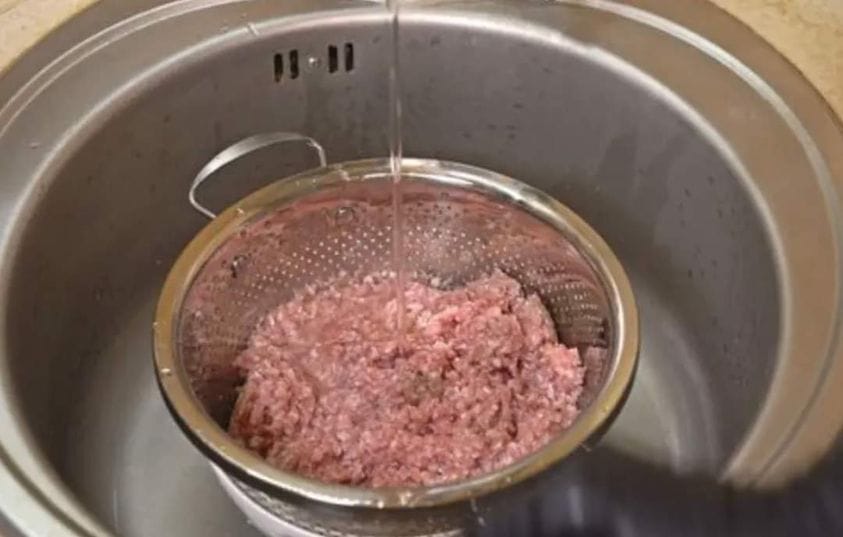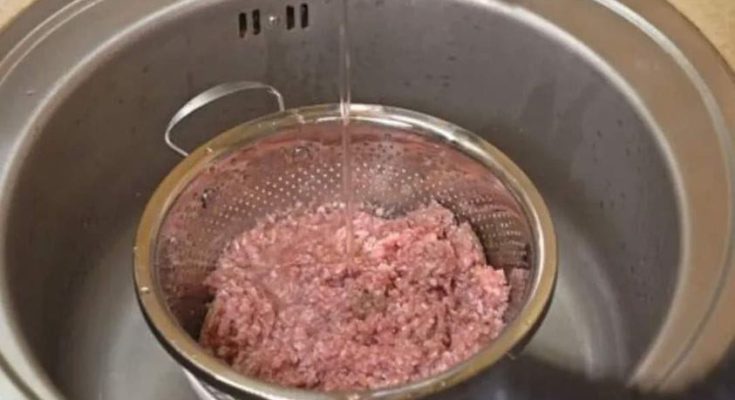When preparing ground beef, many home cooks wonder: should you rinse it before or after cooking? While this may seem like a simple question, opinions on the matter vary. Some believe rinsing has health benefits, while others think it affects flavor and texture. Let’s break down both sides of this culinary debate to help you decide the best approach for your next meal.

Why Some People Choose to Rinse Ground Beef
The main argument for rinsing ground beef, particularly after cooking, centers on reducing fat content. Ground beef, especially when it’s 80% lean or lower, can release a significant amount of grease when cooked. For those aiming to lower their calorie intake or follow a low-fat diet, rinsing seems like an effective solution to cut down on the fat that clings to the cooked meat.
Rinsing ground beef can make it feel less greasy, which can be ideal for dishes where a lighter, less fatty texture is preferred. For example, if you’re making tacos, chili, or spaghetti sauce, rinsing can reduce some of the heaviness, making these dishes more appealing to those who prefer a leaner meal. Additionally, for individuals managing heart health or adhering to a low-fat dietary plan, rinsing the beef can help make meals fit better into these nutritional guidelines.
The Case Against Rinsing Ground Beef
On the other hand, many cooks and chefs oppose rinsing ground beef. One of the strongest arguments against it is the potential loss of flavor. Fat, while often seen as undesirable for health reasons, is also a key component in delivering taste and moisture to ground beef dishes. By washing away the fat, you’re also washing away much of the beef’s natural savory flavor, which can result in a less flavorful meal.
In addition to losing flavor, rinsing can also make the meat dry. Fat acts as a natural moisture enhancer during cooking, helping to keep the beef juicy and tender. By rinsing off the fat, you risk ending up with ground beef that is crumbly and less satisfying, especially in dishes like burgers, meatloaf, or meatballs, where moisture is essential to the dish’s texture.
For those who want to reduce fat while preserving flavor, opting for leaner ground beef (such as 90% or 93% lean) is a better alternative. This way, you can minimize fat content from the start without sacrificing taste. Draining the cooked beef with a spoon or by tilting the pan is another effective way to manage fat levels without rinsing.
Practical Concerns: Mess and Plumbing Issues
Rinsing ground beef can also create practical challenges in the kitchen. Transferring cooked beef to a colander and rinsing it with hot water can be messy. Hot grease can splatter around the sink, creating a cleanup hassle and even posing a burn risk. This extra mess adds time and effort to your cooking routine, which might not be worth the potential fat reduction.
Additionally, rinsing ground beef can lead to plumbing problems. Pouring fat down the drain—even when mixed with hot water—can clog pipes over time. As the grease cools, it solidifies, leading to blockages that cause poor drainage and may require expensive plumbing repairs.
A safer alternative is to allow the fat to cool and solidify before disposing of it in the trash. You can do this by letting it sit in a heat-safe container until it hardens, then scraping it into the garbage. This approach not only prevents plumbing issues but also keeps your kitchen cleaner.
Making the Decision: Rinse or Not?
Whether or not to rinse ground beef is ultimately a personal choice that depends on your health goals, taste preferences, and desired texture. If reducing fat is your top priority, and you don’t mind a slight reduction in flavor, rinsing can be a helpful step. However, if you want to retain the full flavor and juiciness of ground beef, you may prefer not to rinse.
Trying both methods can be a good way to see which works best for your taste and dietary needs. If you’re making a lean dish like a salad topping or a taco filling, rinsing might give you the lighter texture you’re looking for. But for richer dishes like meatballs or burgers, skipping the rinse might result in a tastier, more satisfying meal.
Final Thoughts
Rinsing ground beef has its benefits and drawbacks, making it a personal decision for home cooks. While it can help reduce fat content and fit into certain dietary preferences, it can also diminish flavor and create kitchen messes.
In the end, the key is to choose the approach that best suits your cooking goals. Whether you decide to rinse or not, you can make delicious meals with ground beef by focusing on other elements like seasoning, preparation, and cooking technique. Whatever you choose, enjoy your meal, and happy cooking!



